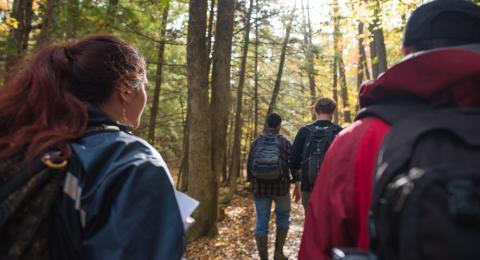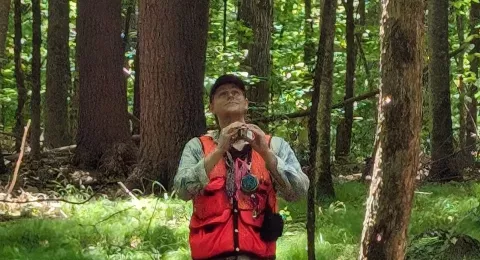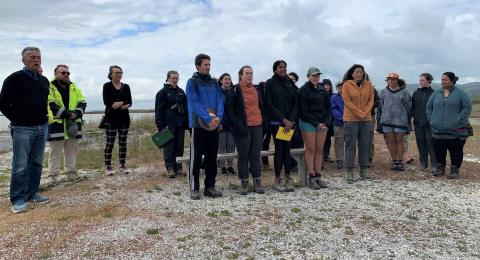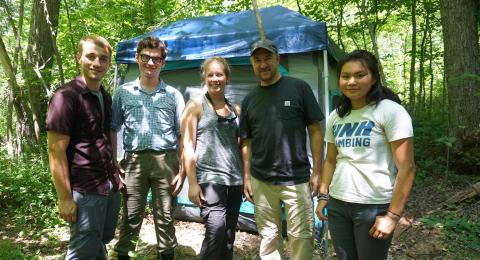About the Forestry major at UNH
The Forestry major at UNH offers you a comprehensive understanding of forest ecosystems, sustainable management practices, and conservation strategies. You will learn to balance ecological health with economic needs, ensuring sustainable use of forest resources and gain the knowledge and skills needed to protect and manage vital forest ecosystems effectively. This major appeals to those passionate about nature, outdoor work and environmental stewardship and is ideal for students who enjoy science, problem-solving and working in natural settings.
What is forestry?
Forestry is the art and science of managing and conserving forests. Our interdisciplinary forestry degree program focuses on sustainable management of forests for productivity, health and biodiversity. Forestry graduates help answer major environmental challenges involving climate change, sustainable development, resource management and biodiversity protection. They also work to protect and restore forest ecosystems, assure a sustainable supply of forest products, provide wildlife habitat and recreational opportunities and care for soil and water resources.
Why study forestry at UNH?
The bachelor of science in forestry at UNH is a professional degree accredited by the Society of American Foresters and is one of four accredited undergraduate forestry programs in New England. Located in second-most forested state in the U.S., UNH is the perfect location to study forestry. Our program emphasizes hands-on experience through intensive lab and fieldwork in university woodlands and in the White Mountain National Forest. Students are encouraged to participate in faculty research projects and UNH’s EcoQuest study-abroad program in New Zealand.
Potential careers
- Education and outreach
- Forest and conservation management
- Forest policy advocacy
- Forestry consulting
- Forestry operations
- Geospatial analysis
- Research
- Research Technician
- Surveying
- Urban forestry
Curriculum & Requirements
Forestry is an interdisciplinary profession, embracing the sustainable management of forest ecosystems for productivity, biodiversity, and health. The Forestry program’s goals are to provide a solid professional preparation with a strong field component, founded in a broad general education, and with the flexibility to allow students to pursue special abilities and interests. The Bachelor of Science in Forestry (B.S.F.) degree is accredited by the Society of American Foresters.
Forestry graduates help manage and conserve public and private forests, addressing major environmental challenges including climate change, biodiversity protection, and sustainable resource management. They use science, planning, and geospatial technology to protect and restore forest ecosystems, ensure a sustainable forest product industry, provide wildlife habitat and recreational opportunities, and conserve soils and watersheds.
Program Mission, Goals and Objectives
The mission of UNH’s Department of Natural Resources and the Environment, of which the Forestry Program is an integral part, is to serve as an educational center for the scholarly study of environmental and social sciences, and their application to the policy and management of natural resources from local to global scales. This is accomplished through education, research and outreach. This mission reflects UNH’s larger mission to provide comprehensive, high-quality undergraduate programs and graduate programs of distinction, including a strong commitment to serving the public good and promoting the excitement of discovery among faculty and students.
The goal of the Forestry Program is to train natural resource professionals to sustainably manage forested landscapes for diverse objectives and in ways that balance changing social, cultural, economic, and environmental interests and priorities.
Our educational objectives are to:
- Develop a strong knowledge base about the ecology and dynamics of forest ecosystems, including interactions between trees, wildlife, insects, soils, water, humans, and other ecosystem components.
- Understand how different policies and management decisions affect forest dynamics over short to long time scales, and on different spatial scales.
- Cultivate the necessary skills to manage forests for diverse objectives and to assess, respect, and balance the interests of different groups to achieve societal benefits.
- Be able to critically evaluate scientific information and integrate this with professional experience and changing societal values to support adaptive management of forest resources.
Sample Degree Plan
This sample degree plan serves as a general guide; students collaborate with their academic advisor to develop a personalized degree plan to meet their academic goals and program requirements.
| First Year | Credits | |
|---|---|---|
| BIOL 528 | Applied Biostatistics I | 4 |
| ENGL 401 | First-Year Writing | 4 |
| Select one of the following: | 4 | |
MATH 424B | Calculus for Life Sciences | |
MATH 420 | Finite Mathematics | |
MATH 425 | Calculus I | |
| NR 415 | Natural Resources Field Methods | 2 |
| NR 425 | Field Dendrology | 4 |
| NR 433 | Wildlife Ecology | 4 |
| BIOL 409 or BIOL 412 | Green Life: Introducing the Botanical Sciences or Introductory Biology: Evolution, Biodiversity and Ecology | 4 |
| Discovery Elective (FPA, HP, ETS, HUM, or WC) | 4 | |
| Discovery Elective (FPA, HP, ETS, HUM, or WC) | 4 | |
| Credits | 34 | |
| Second Year | ||
| CHEM 403 or CHEM 411 or PHYS 401 | General Chemistry I or Introductory Chemistry for Life Sciences or Introduction to Physics I | 4 |
| NR 411 or ECON 402 | Environmental and Resource Economics Perspectives or Principles of Economics (Micro) | 4 |
| NR 501 | Studio Soils | 4 |
| NR 504 | Freshwater Resources | 4 |
| NR 506 | Forest Entomology | 4 |
| NR 527 | Forest Ecology | 4 |
| NR 600 | Work Experience | 0 |
| Oral Communications Skills Course | 4 | |
| Discovery Elective (FPA, HP, HUM, ETS, or WC) | 4 | |
| Credits | 32 | |
| Third Year | ||
| NR 602 | Natural Resources and Environmental Policy | 4 |
| NR 643 | Economics of Forestry | 4 |
| NR 658 | Introduction to Geographic Information Systems | 4 |
| NR 579 | Wildland Fire Ecology and Management | 4 |
| NR 729 | Silviculture | 4 |
| NR 757 | Remote Sensing of the Environment | 4 |
| NR 782 or AGFS 651 | Forest Health in a Changing World or Plant Pathology | 4 |
| Discovery elective (FPA, HP, HUM, ETS, or WC) | 4 | |
| Credits | 32 | |
| Fourth Year | ||
| NR 745 | Forest Management | 4 |
| NR 749 | Forest Inventory and Modeling | 4 |
| Select one of the following: | 4 | |
RMP 711 | Recreation Resource Management | |
NR 767W | Social Impact Assessment | |
RMP 511 | Issues of Wilderness and Nature in American Society | |
| Discovery elective (FPA, HP, HUM, ETS, or WC) | 4 | |
| Elective Coursework | 14 | |
| Credits | 30 | |
| Total Credits | 128 | |
All forestry majors must satisfy the B.S.F. requirements and all Discovery Program requirements. Students must satisfy the Inquiry requirement of the Discovery Program by completing an Inquiry or Inquiry-attribute course. Seniors must also satisfy the capstone experience requirement of the Discovery Program. The capstone explores areas of interest based on the integration of prior learning. The capstone requirement may be satisfied through a course (NR 745 Forest Management), created work or product, or some form of experiential learning (e.g., honors thesis, mentored research project, and other special student activity). Departments are responsible for certifying that graduating seniors have met the capstone requirement for their majors.
Degree Requirements
All Major, Option and Elective Requirements as indicated.
*Major GPA requirements as indicated.
Major Requirements
| Code | Title | Credits |
|---|---|---|
| Required Courses | ||
| BIOL 528 | Applied Biostatistics I | 4 |
| MATH 424B | Calculus for Life Sciences | 4 |
| or MATH 420 | Finite Mathematics | |
| or MATH 425 | Calculus I | |
| NR 415 | Natural Resources Field Methods | 2 |
| NR 425 | Field Dendrology | 4 |
| NR 433 | Wildlife Ecology | 4 |
| BIOL 409 | Green Life: Introducing the Botanical Sciences | 4 |
| or BIOL 412 | Introductory Biology: Evolution, Biodiversity and Ecology | |
| CHEM 403 | General Chemistry I | 4 |
| or CHEM 411 | Introductory Chemistry for Life Sciences | |
| or PHYS 401 | Introduction to Physics I | |
| NR 411 | Environmental and Resource Economics Perspectives | 4 |
| or ECON 402 | Principles of Economics (Micro) | |
| NR 501 | Studio Soils | 4 |
| NR 504 | Freshwater Resources | 4 |
| NR 506 | Forest Entomology | 4 |
| NR 527 | Forest Ecology | 4 |
| NR 600 | Work Experience | 0 |
| CMN 500 | Public Speaking | 4 |
| or THDA 522 | Storytelling, Story Theatre, and Involvement Dramatics | |
| NR 602 | Natural Resources and Environmental Policy | 4 |
| NR 643 | Economics of Forestry | 4 |
| NR 658 | Introduction to Geographic Information Systems | 4 |
| NR 579 | Wildland Fire Ecology and Management | 4 |
| NR 729 | Silviculture | 4 |
| NR 757 | Remote Sensing of the Environment | 4 |
| NR 782 | Forest Health in a Changing World | 4 |
| or AGFS 651 | Plant Pathology | |
| NR 745 | Forest Management | 4 |
| NR 749 | Forest Inventory and Modeling | 4 |
| RMP 711 | Recreation Resource Management | 4 |
| or NR 767W | Social Impact Assessment | |
| or RMP 511 | Issues of Wilderness and Nature in American Society | |
| Total Credits | 90 | |
Program Learning Outcomes
Students will be able to:
- Identify the major species of plants and wildlife and their distribution and habitat requirements.
- Understand the ecological concepts related to the structure, composition, and dynamics of forest ecosystems, including succession, competition, productivity, nutrient cycling, stand development, and wildlife populations.
- Understand soil properties, hydrology, water resources, and watershed functions.
- Understand how forest health and dynamics are impacted by different human and natural disturbances, including pests and diseases, climate change, pollutants, extreme climate events, management interventions.
- Design and conduct forest inventories using appropriate sampling methods and units of measurement.
- Analyze and interpret forest inventory data, and to use the information to project future forest stand development processes and tree conditions.
- Use a variety of spatial analysis tools to assess landscape scale characteristics and produce maps of forest resources distribution.
- Explain forest development trajectories in both written and oral form and apply appropriate computer models and assessment techniques.
- Understand forest policy and the processes that influence policy development.
- Understand and apply economic principles to assessing the financial opportunities and risks of forestry operations.
- Understand how federal, state, and local laws and regulations govern the practice of forestry.
- Understand the administration, ownership, and organization of forest management enterprises.
- Integrate and effectively communicate the technical, financial, human resources, and legal aspects of administering public and private enterprises.
- Develop management plans that effectively integrate and balance multiple landowner (or stakeholder/societal) objectives and the ecological conditions and constraints of the biophysical system.
- Analyze the economic, environmental and social consequences of forest resource management strategies and decisions, and to evaluate their tradeoffs.
- Apply appropriate decision-making tools and techniques to evaluate alternative forest management practices and plans.
- Demonstrate effective problem-solving and teamwork skills, professional and ethical conduct, and respect for diverse values and interests.
- Describe and explain to different audiences in both written and oral form alternative options for managing forest resources to achieve multiple objectives.
Explore Program Details
The Bachelor of Science in Forestry (BSF) Program prepares students to address major environmental challenges including sustainable resource management, biodiversity protection, climate change, recreation opportunities, wildlife habitat, and soil and water conservation through the management and conservation of public and private forests. Our BSF program provides a strong professional foundation with extensive field experiences and a broad general education spanning the biological, physical, economic, and social disciplines that allows students to pursue their special abilities and interests. UNH’s BSF degree is accredited by the Society of American Foresters.
The objectives of the Forestry Program are to: (1) educate professional foresters in a SAF accredited Bachelor of Science in Forestry program oriented toward the practice of forestry in New Hampshire and the Northeast, but broad enough in scope to provide a BSF graduate background in national and international forestry practice, issues and problems; (2) provide opportunities for advanced education in forestry through integration with our Master of Science in Forestry Program and the University-wide PhD program in Natural Resources and Earth Systems Science; (3) conduct forest research required to advance the practice and study of sustainable forestry within New Hampshire, the Northeast, the United States, and the world; and (4) actively assist in the extension mission of the University.
The Forestry major is part of the Department of Natural Resources and the Environment in the College of Life Sciences and Agriculture (COLSA) at UNH.
Forestry is the art and science of managing and conserving forests. Our interdisciplinary forestry degree program focuses on sustainable management of forests for productivity, health and biodiversity. Forestry graduates help answer major environmental challenges involving climate change, sustainable development, resource management and biodiversity protection. They also work to protect and restore forest ecosystems, assure a sustainable supply of forest products, provide wildlife habitat and recreational opportunities and care for soil and water resources.
The Bachelor of Science in Forestry at UNH is a professional degree accredited by the Society of American Foresters and is one of only four accredited undergraduate forestry programs in New England. Located in the second-most forested state in the U.S., UNH is in the perfect location to study forestry. Our program emphasizes hands-on experience through intensive lab and fieldwork in university woodlands and in the White Mountain National Forest. Students are encouraged to participate in faculty research projects and UNH’s EcoQuest: Ecology in Action study abroad program in New Zealand.
The ECS major has 17 core requirements (courses) that are a combination of (1) some foundational courses, (2) some natural science courses, (3) some social science courses, and (4) some skills and tools courses. Examples of core forestry courses include field dendrology, wildlife ecology, forest ecology, silviculture, forest health, natural resource and environmental policy, forest economics, forest entomology, forest inventory and modeling, and recreation resource management.
There are also 4 elective courses that students can choose depending on their particular interests. A senior capstone course “Forest Management” is taken during the student’s senior year (every major at UNH has some capstone experience) and a practicum/internship is completed during the student’s junior or senior year. Finally, all UNH students must complete the university Discovery requirements (i.e., General Education).
Each student is assigned a faculty advisor who helps each student to select the right courses each semester to progress towards graduation.
There are a wide variety of jobs that students graduating with a forestry degree get. Some of the primary career paths include jobs in forest management, forestry consulting, environmental education, natural resource conservation, forest surveying, urban forestry, recreation management, and geospatial analysis. These opportunities are associated with different sectors, including private companies, federal and state agencies, and non-governmental organizations.
Some students get job offers from employers they have worked for during the summer. Many go on to short-time, paid internships to build their resume. Some students also go on to graduate school to continue their education in Forestry or other related fields.
Rigorous academic pursuit and hands-on learning from the mountains to the sea. Full immersion learning at a diversity of sites in the North and South Islands.
Xi Sigma Pi is facilitated through the UNH NREN department. Its goal is to unite likeminded individuals through service and fraternal spirit through a shared enjoyment of the environment. In addition, members receive recognition for their service by earning a cord to wear during graduation. Opportunities to take up leadership roles and give back to the NREN department are abundant.
Students interested in the Forestry major may also be interested in the following advanced degrees at UNH. Students in the program also have the opportunity to participate in the UNH accelerated master’s program.
Natural Resources and the Environment M.S.
Natural Resources: Ecosystem Science M.S.
Natural Resources: Environmental Conservation and Sustainability M.S.
Natural Resources: Environmental Economics M.S.
Natural Resources: Forestry M.S.
















